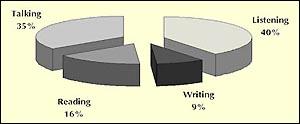| Communication is a key factor for amicable relationships, progress and success in life. Both verbal and non-verbal aspects have been briefl y dealt with in this article. |
The process of communication -
conveying a message from one individual to other - is dependent on six variables:
1. Source
The source is the sender, the originator of the message. The source may be an individual or a group, e.g. a committee, a company, government department, etc.
2. Message
The message is the content - the information that is communicated by the source.
3. Channel
The channel is the means or method, adopted to convey the message.
4. Receiver
The receiver is the destination of the message, the listener or reader. Again, like the source, it may be an individual or a group.
5. Feedback
Feedback is the response of the receiver to the message. Whether or not effective communication has taken place is assessed by the receiver's verbal and non-verbal response.
6. Noise
Noise refers to the factors which cause interference in the channels, thus preventing effective communication. They can be external - physical - or internal - perceptions and experiences.
Today, we are the inheritants of an amazing volume of knowledge related to science, engineering, designing, mathematics, medicine, health, cooking, music, singing, dancing, painting and many other fields. This windfall of information is a consequence of one brilliant thing: effective communication. Conversely, much of the war, violence, strife, blunders and failings we see around the world, between nations, families and individuals have their roots in communication flaws; lack of communication, untimely communication, insensitive communication, false communication and misinterpreted communication.
A couple of examples to illustrate the importance of effective communication.
Many years ago, the British people were awaiting news of the Battle of Waterloo. When, finally, a message was received, only two words got across: "Wellington defeated." The news shocked the public and created an atmosphere of gloom. Shortly, however, the third word got across "Napoleon." Thus, the entire message, which read: "Wellington defeated Napoleon" turned the gloom into joy and resulted in widespread celebrations.
Once, the wife of a wealthy American entrepreneur was on holiday in Paris. While shopping, she viewed a $75,000 bracelet which she wanted to purchase. So, she sent a telegram to her husband back in America, seeking his permission to buy it.
The reply she received read: "No price too high." She interpreted this as permission to purchase. So, she bought the bracelet. Only later did she discover that the actual message was: "No, price too high." When read this way, it reveals the husband's refusal of permission to buy. Thus, omission of a single comma cost $75,000!
In the present era of unprecedented communication brought about through cultural revolutions like freedom of speech, vast and widespread availability of books, magazines and newspapers, together with technological breakthroughs such as the telephone, television, internet and e-mail, misinterpreted communication has emerged as a major malady.
"Define your terms," insisted the French 17th century philosopher and playwright Voltaire whenever he engaged anyone in conversation. There really is no point spending time discussing something with someone and later finding out you were debating or discussing two entirely different subjects. Such misunderstandings are not uncommon. In a recent documentary by the BBC, it was shown that managers spend 40% of their day in meetings. Yet two thirds of these meetings fail to meet their goals because of bungled communication leading workers to spend 40% of their time doing unnecessary tasks or redoing them because they were not done according to instructions.
Nothing implicitly conveyed should be taken for granted as having been understood by the listener. So many communication blunders occur because communicators expect other people to hear between the lines. It is a potentially disastrous form of communication and is stressful and perplexing for listeners who have to decipher the words.
Effective Listening
One obvious solution to avoiding communication blunders is simply learning to listen more
attentively. Remember, it takes two to tango: listeners and speakers are part and parcel of a communication gap. Each, therefore, should look for feedback from the other to ascertain the other has heard and understood correctly. An instructor should ask a worker to repeat the instructions he has been given. A worker too, should ask an instructor to repeat the feedback he has given. In today's social hierarchy, the latter is certainly tougher for managers who may feel their authority is being undermined through such questioning, but it's the best way to avoid expensive mistakes later.

Thus, listening is an important communication skill. We spend 70% of our waking hours in verbal communication and 40% of that time in listening.
Thus, as a means to gathering information, listening is used far more than reading and writing combined. However, it is often assumed to be the same as hearing. Whereas hearing is an instinctive, passive process, listening is an active process, requiring much energy and discipline to perfect.
That's why one author wrote, "It's a mistake to think we listen only with our ears. It's much more important to  listen with the mind, the eyes, the body, and the heart. Unless you truly want to understand the other person, you'll never be able to listen."
listen with the mind, the eyes, the body, and the heart. Unless you truly want to understand the other person, you'll never be able to listen."
Hence, listening is an acquired communication skill, which can be improved by following six steps:
L: Look at the person speaking to you
A: Ask questions
D: Don't interrupt
D: Don't change the subject
E: Empathise
R: Respond verbally and non-verbally
This is the LADDER to better listening.
Non-Verbal communication
People should also learn to use their eyes more. Psychologists have shown that 80% of one-to-one dialogue also includes non-verbal communication. So look for tell-tale signs revealed through a person's body language, facial expression, voice tone, eye contact or lack of it. These indirect signals reveal far more about what a person is thinking and feeling than just his or her words. Even more importantly, the listener becomes more human and sensitive. The communication becomes fuller, more meaningful and warmer. The duo become soul mates and the relationship flourishes emotionally, socially and financially. This form of listening is known as empathetic listening. Empathetic listeners, however, are not supposed to remain silent zombies. From their side, they have to reciprocate with appreciative eye-signals, nod their heads and say a few words acknowledging the feelings of the speaker.
Other factors
Other reasons why people fail to listen properly are because of prejudice, fear and desire. They think they already know what you are going to say and are convinced that you are wrong. They are convinced that their perspective alone is credible. But conviction is never proof of certainty. Even the dimmest of human beings should be given a fair and open hearing before judgment is pronounced.
Fear is another reason why communications fail. The speaker is afraid to hurt the listener or afraid his words might backfire in some way - causing loss of face, status or relationship. Conversely the listener may be afraid of the intentions of the speaker and therefore chooses not to act on his instructions or advice. To remedy this problem, faith must first be instilled between the two individuals and both must decide mutually to take the other's words in good faith and spirit.
Desire is the third cause of communication short-circuits. If you say something that goes against the wishes and fantasies of the listener, he or she tends to switch off and look upon you as an enemy. Says Bhagwan Swaminarayan in His Vachnamrut sermons Gadhada II-1, "If the Sant or one's guru or one's Ishtadev - God - should criticise a vishay towards which one's chitt has been lured, one would become upset with them and even malign them; one would not be able to accept their words." Then what to say when ordinary mortals like us are expounding? In such a situation it is important to initially try and gain an insight into the desires and emotional needs of the listener and then to try and put across ideas in such a fashion that the situation becomes Win-Win. Find a compromise; a middle path.
Lastly, instead of giving abstract or logical arguments to people, narrating some real life incidents would convey far more information to the listener. This method makes it easier for the listener to tune into your frequency and understand what you are saying.
But what do you do if there is a total breakdown of communication? When the other person simply refuses to listen to you or even sit near you? One route is to write a letter or small note. Such a letter should be filled with intimacy and should declare to some degree one's own negative role in the breakdown of the relationship. This will induce the other person to accept his portion of the blame too. It gives both of you a chance to make up, forgive and begin things anew. For example, an adolescent who was not on speaking terms with his mother was deeply touched one night when he found a small letter under his pillow. It read: "Dear son, I know I don't always say the right thing and frequently misunderstand you. I am sorry I am not the perfect mother of your expectations but I want you to know that I love you always." The boy was moved to tears and he and his mother came back together again. What a miracle a simple, self-revealing and empathetic letter of a few lines can work!
Here are ten tips on improving communication skills. Try them and see how your relationships with people begin to grow and flourish!
- Reach out to others - directly, by phone, letter or note
- Keep your mouth shut but eyes and ears open
- Seek first to understand, then to be understood
- Listen for unasked for information i.e. hot buttons
- Always respect a person's feelings and hot-button beliefs
- Ask open-ended questions, e.g. How? Why?
- Don't listen with intent to reply
- Remember and use the person's name
- End the conversation on a positive, warm note
- Brahmaswarup Yogiji Maharaj's and the Bhagwad Gita's magic formula: Utter only those words which are: truthful (satya), beneficial (hit) and palatable (priya). Otherwise remain quiet.